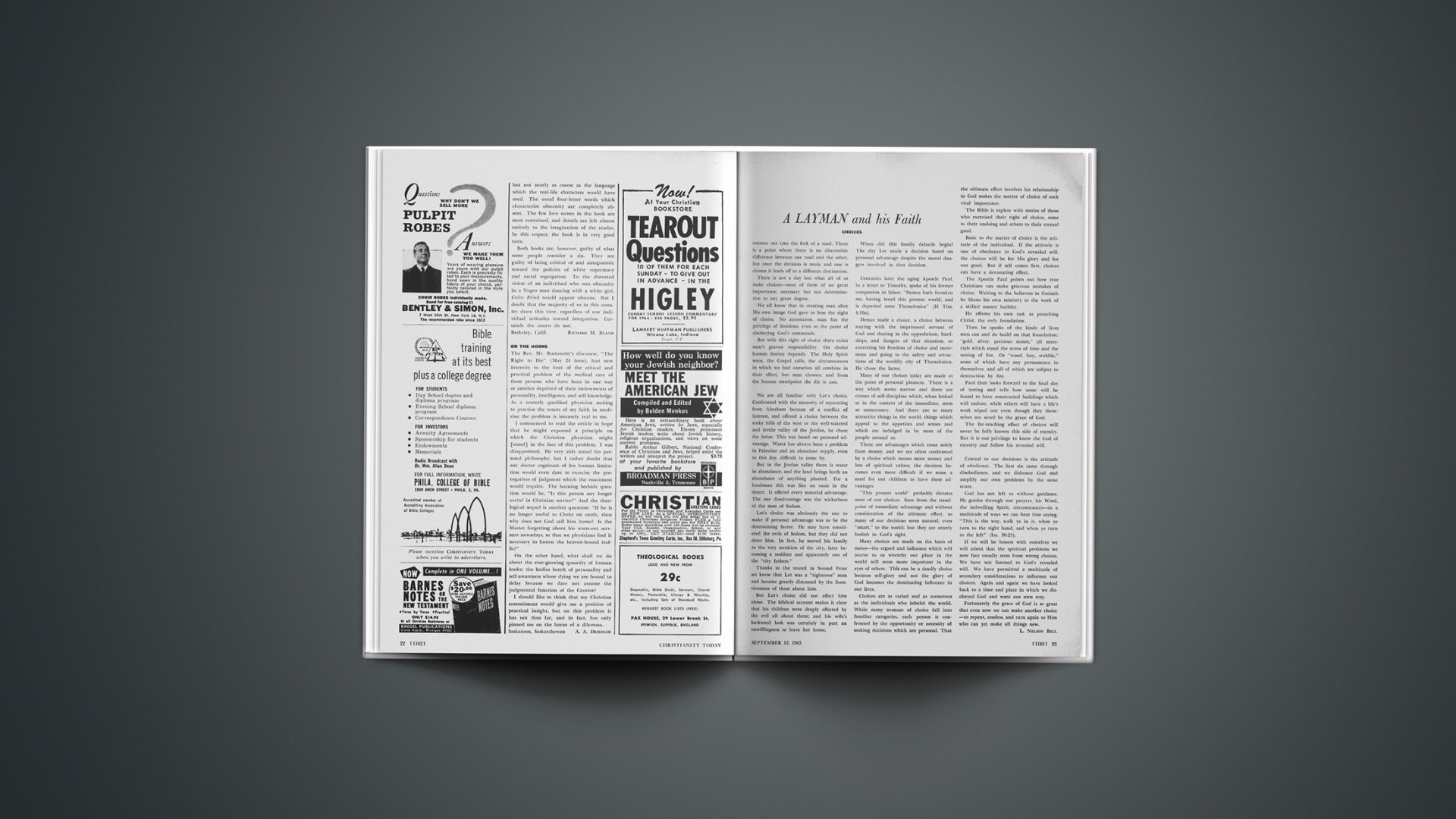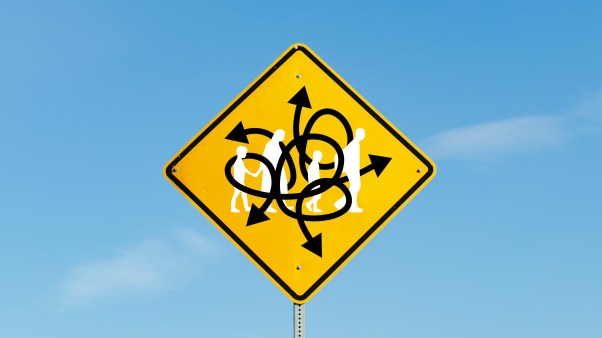Choices are like the fork of a road. There is a point where there is no discernible difference between one road and the other, but once the decision is made and one is chosen it leads off to a different destination.
There is not a day but what all of us make choices—most of them of no great importance, necessary but not determinative to any great degree.
We all know that in creating man after His own image God gave to him the right of choice. No automaton, man has the privilege of decisions, even to the point of disobeying God’s commands.
But with this right of choice there exists man’s gravest responsibility. On choice human destiny depends. The Holy Spirit woos, the Gospel calls, the circumstances in which we find ourselves all combine in their effect, but man chooses, and from the human standpoint the die is cast.
We are all familiar with Lot’s choice. Confronted with the necessity of separating from Abraham because of a conflict of interest, and offered a choice between the rocky hills of the west or the well-watered and fertile valley of the Jordan, he chose the latter. This was based on personal advantage. Water has always been a problem in Palestine and an abundant supply, even to this day, difficult to come by.
But in the Jordan valley there is water in abundance, and the land brings forth an abundance of anything planted. For a herdsman this was like an oasis in the desert. It offered every material advantage. The one disadvantage was the wickedness of the men of Sodom.
Lot’s choice was obviously the one to make if personal advantage was to be the determining factor. He may have considered the evils of Sodom, but they did not deter him. In fact, he moved his family to the very outskirts of the city, later becoming a resident and apparently one of the “city fathers.”
Thanks to the record in Second Peter we know that Lot was a “righteous” man and became greatly distressed by the licentiousness of those about him.
But Lot’s choice did not affect him alone. The biblical account makes it clear that his children were deeply affected by the evil all about them; and his wife’s backward look was certainly in part an unwillingness to leave her home.
When did this family debacle begin? The day Lot made a decision based on personal advantage despite the moral dangers involved in that decision.
Centuries later the aging Apostle Paul, in a letter to Timothy, spoke of his former companion in labor: “Demas hath forsaken me, having loved this present world, and is departed unto Thessalonica” (2 Tim. 4:10a).
Demas made a choice, a choice between staying with the imprisoned servant of God and sharing in the opprobrium, hardships, and dangers of that situation, or exercising his freedom of choice and movement and going to the safety and attractions of the worldly city of Thessalonica. He chose the latter.
Many of our choices today are made at the point of personal pleasure. There is a way which seems narrow and there are crosses of self-discipline which, when looked at in the context of the immediate, seem so unnecessary. And there are so many attractive things in the world, things which appeal to the appetites and senses and which are indulged in by most of the people around us.
There are advantages which come solely from money, and we are often confronted by a choice which means more money and less of spiritual values; the decision becomes even more difficult if we sense a need for our children to have these advantages.
“This present world” probably dictates most of our choices. Seen from the standpoint of immediate advantage and without consideration of the ultimate effect, so many of our decisions seem natural, even “smart,” to the world; but they are utterly foolish in God’s sight.
Many choices are made on the basis of status—the regard and influence which will accrue to us whereby our place in the world will seem more important in the eyes of others. This can be a deadly choice because self-glory and not the glory of God becomes the dominating influence in our lives.
Choices are as varied and as numerous as the individuals who inhabit the world. While many avenues of choice fall into familiar categories, each person is confronted by the opportunity or necessity of making decisions which are personal. That the ultimate effect involves his relationship to God makes the matter of choice of such vital importance.
The Bible is replete with stories of those who exercised their right of choice, some to their undoing and others to their eternal good.
Basic to the matter of choice is the attitude of the individual. If the attitude is one of obedience to God’s revealed will, the choices will be for His glory and for our good. But if self comes first, choices can have a devastating effect.
The Apostle Paul points out how true Christians can make grievous mistakes of choice. Writing to the believers in Corinth he likens his own ministry to the work of a skilled master builder.
He affirms his own task as preaching Christ, the only foundation.
Then he speaks of the kinds of lives men can and do build on that foundation: “gold, silver, precious stones,” all materials which stand the stress of time and the testing of fire. Or “wood, hay, stubble,” none of which have any permanence in themselves, and all of which are subject to destruction by fire.
Paul then looks forward to the final day of testing and tells how some will be found to have constructed buildings which will endure, while others will have a life’s work wiped out even though they themselves are saved by the grace of God.
The far-reaching effect of choices will never be fully known this side of eternity. But it is our privilege to know the God of eternity and follow his revealed will.
Central to our decisions is the attitude of obedience. The first sin came through disobedience, and we dishonor God and amplify our own problems by the same route.
God has not left us without guidance. He guides through our prayers, his Word, the indwelling Spirit, circumstances—in a multitude of ways we can hear him saying, “This is the way, walk ye in it, when ye turn to the right hand, and when ye turn to the left” (Isa. 30:21).
If we will be honest with ourselves we will admit that the spiritual problems we now face usually stem from wrong choices. We have not listened to God’s revealed will. We have permitted a multitude of secondary considerations to influence our choices. Again and again we have looked back to a time and place in which we disobeyed God and went our own way.
Fortunately the grace of God is so great that even now we can make another choice—to repent, confess, and turn again to Him who can yet make all things new.










